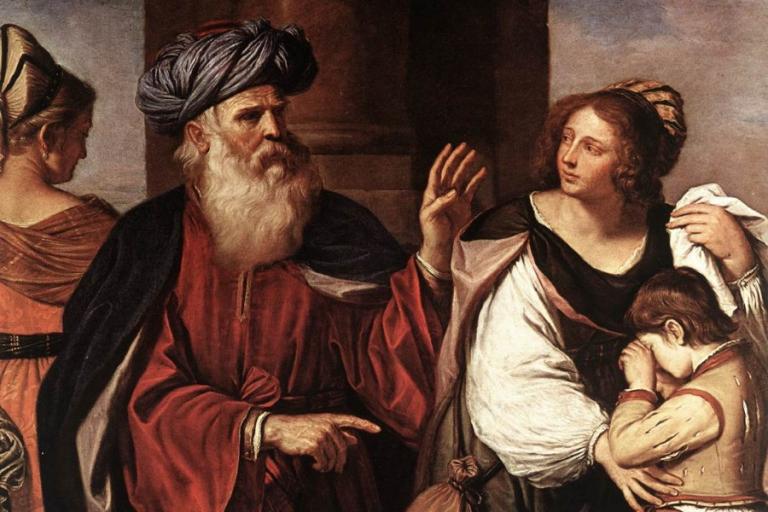In the previous post, I made the claim that patriarchy—rather than polygamy—is the primary source of problems in biblical polygamous marriages. Be sure to read that post before reading this one. As promised, I’ll now examine in depth some of the Bible’s most prominent polygamous marriages, beginning with that of Abram.
Trigger warning: This scriptural account contains slavery, rape, and other abuses.
Sarai
When we read of Abram marrying Sarai (Genesis 11:29), the very first detail we’re told about her is that “Sarai was barren; she had no child” (v. 30).1 Thus her primary duty according the system of patriarchy—to produce a male heir for her husband—cannot be fulfilled. This detail, rather than any of the other wonderful qualities she no doubt possesses, defines her as a person, and it is the driving force behind much of the narrative that follows.
Despite Sarai’s infertility, God promises to make Abram into a great nation, to bless him, to make his name great, to give land to his descendents—all implying that he will indeed have a male heir (12:1–7). How God will accomplish this is not yet stated.
In the meantime, in order to save his own neck, Abram passes Sarai off as merely his sister, allowing her to be taken into Pharaoh’s household (vv. 11–16). Ownership of Sarai then passes temporarily to Pharaoh, until God inflicts plagues on Pharaoh, at which point Pharaoh sends Abram back “his wife and all that belonged to him”—lumping Sarai in with the rest of Abram’s property (vv. 17–20).
Jumping forward a few chapters, Abram finally asks how God will get around Sarai’s infertility in order to fulfil his promises. Will Abram’s blessings pass to his head slave, Eliezer? No, God replies, a son from Abram’s own body will be his heir (Genesis 15:1–4). But this still doesn’t answer how such a son will be born, as Sarai is still unable to conceive (16:1).
Hagar

Given the patriarchal framework under which she lived, Sarai comes to the understandable conclusion that Abram will have to take another wife in order to acquire an heir. So Sarai exerts what little power she has and suggests that Abram take her slave-girl, Hagar. In this way, Sarai reasons, the child will still be hers in a secondary sense, as Hagar is her slave (vv. 1–2). Better this than to be passed over entirely for a new wife over whom Sarai has no control.
But of course this just takes their patriarchy to an even further extreme. In as much as Sarai is already treated as Abram’s property, Hagar is literally the property of his property. Unlike polyamorous polygamy, there is no sense here in which Hagar becomes a beloved second partner to Abram. She is treated as nothing more than the means to an end. If Sarai is defined by her infertility, then Hagar is defined by her ability to provide Abram with an heir.
We’re not told how old Hagar is, but the word used to describe her implies a young age—certainly far younger than Abram. And as a slave, she has absolutely no say in this matter herself. Her sexuality is entirely at the disposal of others, so she cannot possibly offer true consent. Given the power dynamics and the lack of consent, this is nothing short of rape. I understand the pushback some will offer against judging ancient people by modern standards, and that is not my intent. But speaking from the perspective of the victim, what Hagar experienced was rape, plain and simple.
When Abram takes Hagar, she conceives, but the plan backfires on them. Hagar—with good reason—no longer respects Sarai. Can we expect any different after such treatment? Sarai complains to Abram about it, and spineless Abram gives Sarai permission to do whatever she wants to her slave. Hagar is nothing more than the property of property, after all. Sarai then inflicts even further mistreatment on Hagar, and Hagar runs away (vv. 3–6).
At this point, the patriarchal nature of this narrative reaches its height, as the narrator suggests that even God sides with Abram’s patriarchy. Yahweh’s angel visits Hagar in the wilderness, addressing her as “Hagar, Sarai’s slave-girl”—lest she forget her standing as property (vv. 7–8). After rhetorically asking Hagar where she is going, God’s angel then commands the unthinkable, “Go back to your mistress and submit to ill-treatment at her hands” (v. 9).
Lest there be any doubt, at this point we need to establish that the narrator is 100% wrong here. God does not approve of patriarchy. God never sides with oppressors over the oppressed. And God certainly does not ask victims to return to their abusers or submit to further abuse. Such suggestions are nothing short of blasphemous to the character of God, and they are unimaginably harmful to victims of abuse. God did not ask Hagar to return and submit, as the narrator would have us believe.
The supposed blessing that follows hardly makes it any better. It amounts to nothing more than that her (male) descendants will be numerous (v. 10). Hagar herself will have to remain in an abusive situation (v. 11). As for her son, Ishmael, “He will be like the wild ass; his hand will be against everyone and everyone’s hand against him; and he will live at odds with all his kin” (v. 12). Not very comforting.
Following this whole debacle, it turns out that God actually is going to give Sarai a child after all. With her defining feature of barrenness reversed, Sarai becomes Sarah. She can now fulfil her patriarchally prescribed duty and give her husband a male heir (17:15–21).
For the sake of space, we’ll skip past the account of Lot, who offers up his daughters to be raped in order to spare his male guests. And we’ll skip past the second time that Abram—now called Abraham—passes his wife off as merely his sister, allowing King Abimelech to take her. And we’ll come to chapter 21, where Sarah conceives and bears “a son to Abraham in his old age,” whom “Abraham named Isaac” (vv. 2–3).
As Ishmael and Isaac grow older, Sarah sees the two interacting,2 and she says to Abraham, “Drive out this slave-girl and her son! I will not have this slave’s son sharing the inheritance with my son Isaac” (v. 10). Abraham is “very upset at this”—not because he cares about Hagar, but “because of Ishmael” (v. 11). But God steps in again and supposedly tells Abraham, “Do as Sarah says” (v. 12). Abraham sends them out into the wilderness of Beersheba, where God’s angel again visits Hagar (vv. 14–18). God directs her to a well, Ishmael grows up to become an archer, and Hagar finds him a wife from Egypt (vv. 19–21).
Keturah & others
Apart from a later list of descendants, this is the last we hear about Hagar. Sarah eventually dies (23:2). After mourning her for a while, Abraham marries another wife, named Keturah—about whom we are told very little, other than that she bears six sons for Abraham (25:1–2). The text goes on to imply that Abraham has multiple concubines as well, but it provides no further details about them (v. 6).
Conclusion
That Abraham’s wives had a messy and complicated relationship is beyond dispute. But by my reading, the reason for such complications is clear—Abraham treated them like property. They existed, for Abraham, to produce a male heir, and they could otherwise be disposed of as he pleased. This is the essence of patriarchy, and this is the source of their problems. Such patriarchal polygamy is absolutely not polyamory.
In the next post, I’ll examine the marriage of Jacob to Leah, Rachel, Bilhah, and Zilpah.
Footnotes
1 All scripture quotations that follow are taken from The Revised English Bible.
2 The Hebrew text here is vague and has several possible meanings. It could be that Ishmael was simply playing with Isaac, but it could also be that he was mocking or making fun of him. A more extreme possibility is that he was molesting him. The examination of this question lies beyond the scope of our current discussion.
Posts on polyamory
- It’s Time for the Church to Talk About Polyamory
- Conflating Polyamory, the LGBTQ Community, and Orientation
- What Polyamory Is Not
- Christian Sexual Ethics and Polyamory
- Southern Baptist Preacher Affirms Polyamory (Interview with Rev. Dr. Jeff Hood)
- Is God Polyamorous?
- 5 Reasons for Writing about Polyamorous Families (Guest Post by Mark Kille)
- Polyamory and the Kingdom of God (by Christian Chiakulas on Radical Christian Millennial)
- What Are Polyamorous Christians to Make of Karl Barth? (Guest Post)
- Polygamy and the Problem of Patriarchy
- Abram’s Marriage to Sarai, Hagar, Keturah & Others
- Jacob’s Marriage to Leah, Rachel, Bilhah & Zilpah
- The Many Marriages of David & Solomon
- Forthcoming…
















